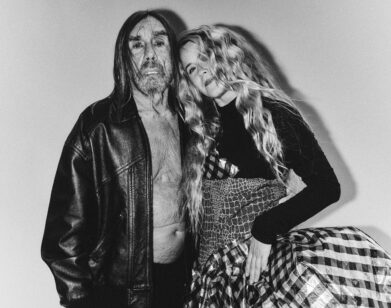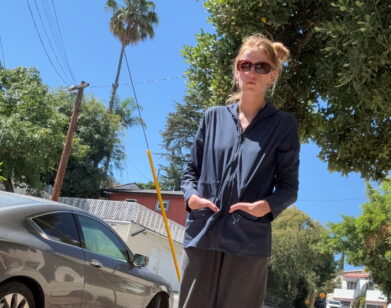Jack Dolgen Returns Triumphant

Jack Dolgen’s attempt to leave the music world was halted by the music gods, who obviously knew he had another album up his sleeve. After creating his first album, Maricopa, in between working a variety of jobs (including being Sam Champion’s bassist), Dolgen wasn’t sure if he was going to make a career out of music. Bolstered by several TV and film placements, though, he realized he wasn’t done making music. The result was Wandering Times, a collection of swoon-worthy indie-pop songs that chart the emotional journey Dolgen went through to find his peace in music once again. It’s obvious this album was a blessing in disguise.
We spoke with Jack Dolgen about his return to music, writing comedy songs and being a “Jack of All Trades.”
ILANA KAPLAN: Are you from New Jersey, by any chance?
JACK DOLGEN: No. I used to live in New York. I grew up in Arizona. Then I lived in New York for ten years, and then I moved to LA.
KAPLAN: Your album, from what I know, wasn’t supposed to happen. You had kind of given up on having a music career. What forced you back into it?
DOLGEN: Well, yeah. That’s right. I kind of fell backwards back into it. I had finished my first record and moved out to LA with the idea that I was not going to be doing any more of my own music. I put all of my instruments in my garage, and I sort of tried to ignore them. Then, I started getting placements from my first record for songs on TV shows. That was kind of a strange thing for me, because it felt like this thing I had done a really long time ago—it wasn’t really that long ago—that kept coming back. It felt disjointed; it felt like it was this past life. I started getting opportunities to do more TV and film music. I started just going with it a little bit. I felt like, Wow, I was trying to quit this thing, and it just came back through the door and was like, oh, “You’re not gonna quit.” It took me a little while to kind of face that. So, I said, All right; maybe I’ll record another song. Then I recorded another song and a bunch more. It was weird, it felt like the music gods were not allowing me to quit so I just sort of went with it. I was in an okay place in my head to go ahead with it.
KAPLAN: When you haven’t been making your music, have you been working in other fields? Has your heart always been in music?
DOLGEN: Yeah. I mean I never did really well with regular jobs. I used to work for the Parks Department when I lived in New York. I wasn’t really very good at it, in the sense that I would end up sitting at my desk writing poems. I wasn’t the best worker, I was trapped in my own world. I would sit at my desk, write poetry, and just print it out because I couldn’t save it on my work computer. I had stacks and stacks of poems from when I was working at my desk job. So, that wasn’t ever really the best fit for me. I also had this other project, I was always working on projects and making the financial thing work. When I started to get film and TV stuff going, I was sort of able to transition away from things other than music. It just became my job. So far, I’ve been lucky enough to make my living doing music one way or another; whether it’s through the songs that get on TV, producing or co-writing.
KAPLAN: So, you’re a “Jack of All Trades,” it sounds like.
DOLGEN: [laughs] I think I’m a “Jack of All Trades” that isn’t really good at any of the trades.
KAPLAN: That’s definitely not true. Sorry, that was a really nerdy pun.
DOLGEN: I think puns make the world turn.
KAPLAN: You use the song “Daytime” on both Maricopa and Wandering Times. Do you sing with a specific female singer a lot on that album, or was it a one-off performer that came in?
DOLGEN: On the Maricopa record, in “Daytime” and “Our Light,” which are both on Wandering Times, Holly Miranda is singing the female vocals. She’s amazing. In New York, she’s a great musician. So she’s doing that. On the rest of Wandering Times, I didn’t have any more female vocalists. There are some tracks on Maricopa where I had a bunch of friends come and sing backup vocals. So, you might hear that.
KAPLAN: I do feel like most of your music is pretty upbeat, but has a tinge of angst to it, as seen in “Baby I’m Afraid Tonight.” Is your music meant to be happy and uplifting, or is it the result of some darker periods in your life?
DOLGEN: I think that they kind of exist together. I think that if the song is good, then it probably has elements of both extremes and sort of the spectrum of emotions. The happy songs or the songs that come off on a surface level as happy must have a combination of brightness and darkness. That’s just what life is. Plus, I think songs—like any kind of art—the more extreme and singular, the more false it is. I know you’re kind of limiting expression when you create one little song or one little painting. You can’t express everything, but the more you get in, the more real it is.
KAPLAN: Are you just focusing on music now, or are you dabbling in side projects?
DOLGEN: I still do some other stuff. I co-write and produce with my friend Rachel Blume. She’s a great comedian and singer, She does these comedy songs and videos. I’m working on producing a record for another artist, who is really fantastic and really unknown. I still write, and I co-host a podcast with a friend that has nothing to do with music. I take projects as they come, I wrote a book with my mom a while ago. I like to just stay open to whatever comes in. If it’s cool, then I try and do it.
KAPLAN: So, you’re kind of a funny guy, I would say.
DOLGEN: [laughs] I feel funny. I feel really funny. Weird.
KAPLAN: Writing and being funny is not something everyone can do. I am not funny when I write, most of the time. It’s very hard.
DOLGEN: I really love doing the comedy songs because it’s a combination of two different worlds. The way we do it is, we try and make the songs as if you didn’t get the jokes or if you’re new to English, we try to make really killer tracks [that] are true to the genre that we’re trying to do. On top of that is the joke of it. Rachel is super talented, gets a lot of hits on YouTube and a lot of love for what she does. It’s been pretty fun.
KAPLAN: Is Wandering Times made up of a bunch of stories or just one?
DOLGEN: That’s a good question. I think the answer is probably both. Not to be so consistently ambivalent, but I think that Wandering Times as a record holds a singular thing that contains a multitude of experience. From song to song, we might touch on different areas of what that is, but I think as a whole, it comes together with a little bit of a consistency. For me, I look back at the songs and learn from them after they’re done, just as much as someone who has never heard them before. I am always trying to figure out what the song is, what it means, and how to learn from it.
JACK DOLGEN’S SOPHOMORE ALBUM WANDERING TIMES COMES OUT TOMORROW.






